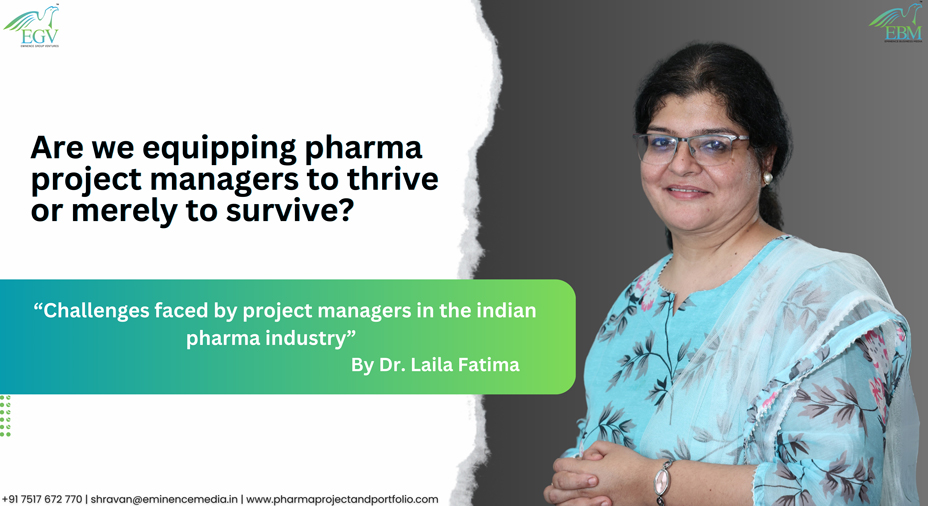
Disclaimer: The views and opinions expressed in this article are those of the author and do not necessarily reflect the official policy or position of Novartis or any of its officers.
Introduction: Project managers in the Indian pharmaceutical industry deal with different kinds of projects that involve ensuring compliance with regulatory & quality standards; managing multiple projects at a time while ensuring there is enough rapport with all stakeholders! Let us understand the challenges that lie on the path of a project manager navigating his day through a highly evolved and complex industry.
- Intricate Regulatory Landscape:
The pharmaceutical industry is highly regulated, which means project managers must ensure compliance with various standards and regulations. This depends on the market segment targeted- US, Europe, ROW etc. This adds complexity to project management activities. According to the ISPE Good Practice Guide: Project Management for the Pharmaceutical Industry**, project managers in this field face unique challenges due to the highly regulated environment. They must integrate Good Practice (GxP) with project management activities to manage compliance risks effectively and proactively. This means PMs need to understand the regulatory requirements of their projects and fine tune their project plans accordingly. Question: Are we training our PMs enough in this space? Is it fair to expect the PM to know it all without adequate training?

- Too many projects per person:
Project managers are often spread thin, juggling multiple projects simultaneously. This overextension can significantly reduce their ability to add true value. The strain of managing several projects at once hinders their capacity to manage risks in a timely and proactive manner. Consequently, potential issues that could have been escalated and addressed early on may escalate into serious problems, impacting project timelines and outcomes. Often, PMs watch out for critical tasks and focus only on the urgent and important tasks, leaving room for misses and gaps. There needs to be adequate governance to balance capability vs. demand. Too many projects create stress and hamper productivity and curb free thinking. Question: Are we taking stock of this?
- Empowerment:
Depending on the structure of the organisation and the reporting matrix, PMs are often left with very little power to be called project leaders; rather, they function as project coordinators. This limited empowerment affects their ability to make crucial decisions swiftly, impacting the overall project momentum. Empowerment is key to ensuring that PMs can execute their responsibilities effectively, by granting them the authority to make decisions, allocate resources, and influence project outcomes. Without this, PMs may find themselves constrained by bureaucratic processes, unable to drive projects forward with the agility required in the fast-paced pharmaceutical industry. Question: Are we empowering our PMs enough to work like leaders? My recommendation would be to give them freedom to organise and run their projects (and meetings!) and foster team building while ensuring adequate governance and support in decision making and time management. A PM is part of your team and not someone hired to make unnecessary noise & point errors or mistakes. Trust them and they will do their job!

- Communication and Stakeholder Management:
Effective communication is vital in pharmaceutical project management. PMs must liaise with various stakeholders, including researchers, quality, manufacturing teams, and upper management. Miscommunication or lack of communication can lead to misunderstandings, delays, and non-compliance issues. Therefore, PMs need to have strong interpersonal skills and a strategic approach to stakeholder management to keep everyone aligned and informed throughout the project lifecycle. This is the key skill required for hiring PMs in their role. Question: Can anyone enter project management? My recommendation would be to look for persons with strong communication and interpersonal skills. And keep training them!
- Constraints:
These need no explanation. Project managers must navigate (plus communicate) all limitations related to financial, technological, human resources and make optimal use of available resources. And there is no choice! Project buffers are usually managed by finance teams and overestimates are not allowed. At the same time, underspending shows poor planning performance and delayed execution. My recommendation is to assume 10% extra in budget and timelines and call it out clearly in all calculations.
 Conclusion
Conclusion
In conclusion, project managers in the pharmaceutical industry face a unique set of challenges that require a blend of regulatory knowledge, leadership skills, effective communication, and resourcefulness Addressing these challenges head-on can lead to more efficient project completion, compliance with regulatory standards, and ultimately, successful outcomes in bringing new pharmaceuticals to market.


A very insightful write up
Concisely written article